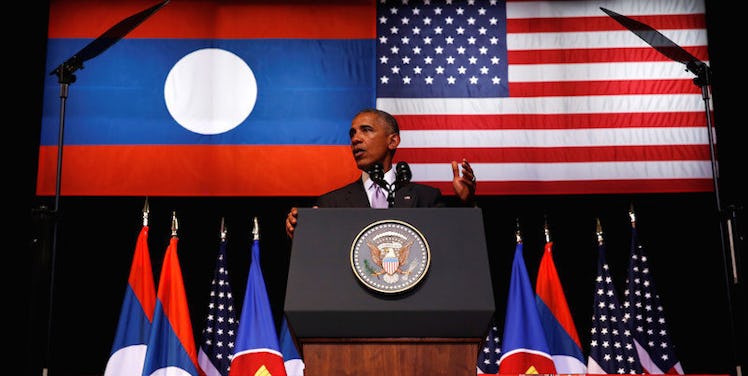
President Obama Is Giving $90 Million To Laos To Clean Up A Mess The US Made
It's no secret that the US has done some very shady things across the globe. Although, it's not always the best at acknowledging this.
This includes America's dubious "secret war" the CIA orchestrated in Laos during the Vietnam War, where the US conducted 580,000 bombing missions and dropped over two million tons of explosives -- more than 270 million cluster bombs.
Laos was officially neutral during the Vietnam War, but the US believed communist groups in the country were aiding the North Vietnamese and providing them with supplies, which is what inspired the massive and secretive bombing campaign.
The US dropped more explosives on Laos during this time than it did on Germany or Japan during World War II. This made Laos, per capita, the most heavily bombed country in history.
Over 80 million bombs the US dropped on Laos never exploded, and dozens of Laotians are injured every year because of this.
Roughly 20,000 people have been killed or maimed by unexploded bombs dropped by the US in Laos since the Vietnam War ended.
On Tuesday, President Obama became the first sitting president in history to visit Laos, and he addressed the devastating impact America's activities had in the country.
While in Laos, the president pledged $90 million dollars over the next three years to help clean up the unexploded bombs.
In a speech delivered in Vientiane, the capital of Laos, the president stated,
I realize that having a U.S. president in Laos would have once been unimaginable. Six decades ago, this country fell into civil war. And as the fighting raged next door in Vietnam, your neighbors and foreign powers, including the United States, intervened here. As a result of that conflict and its aftermath, many people fled or were driven from their homes. At the time, the U.S. government did not acknowledge America's role. It was a secret war, and for years, the American people did not know. Even now, many Americans are not fully aware of this chapter in our history, and it's important that we remember today...
President Obama described in detail what the US did in Laos during the Vietnam War, and it's not pretty. Obama said,
Over nine years -- from 1964 to 1973 -- the United States dropped more than two million tons of bombs here in Laos... As one Laotian said, the 'bombs fell like rain.' Villages and entire valleys were obliterated. The ancient Plain of Jars was devastated. Countless civilians were killed. And that conflict was another reminder that, whatever the cause, whatever our intentions, war inflicts a terrible toll, especially on innocent men, women and children. Today, I stand with you in acknowledging the suffering and sacrifices on all sides of that conflict.
It's rare for an American president to speak so candidly about awful things the US did in the past, particularly in such a direct way.
But it's clear President Obama feels the US can't turn a blind eye to history and has a responsibility to address what it's done.
The president went on to say,
The remnants of war continue to shatter lives here in Laos. Many of the bombs that were dropped were never exploded. Over the years, thousands of Laotians have been killed or injured -- farmers tending their fields, children playing. The wounds -- a missing leg or arm -- last a lifetime. And that's why, as President, I've dramatically increased our funding to help remove these unexploded bombs. As a result, Laos is clearing more bombs. Fewer Laotians are being hurt or killed. And together, we are saving lives. But there is still much more work to do. So today, I'm proud to announce a historic increase in these efforts. The United States will double our annual funding to $90 million over the next three years to help Laos expand its work... Given our history here, I believe that the United States has a moral obligation to help Laos heal.
In response to President Obama's pledge to help clean up the unexploded bombs, Laotian President Bounnhang Vorach said his country would ramp up its efforts to locate and return American servicemen missing in the war.